Sociology Essay: Rationality, Bias, and Decision-Making
VerifiedAdded on 2022/10/01
|10
|2549
|306
Essay
AI Summary
This sociology essay delves into the complexities of managerial decision-making, exploring the interplay of rationality, bias, emotions, and motivations. It examines how these factors influence the decision-making process, drawing on theoretical frameworks such as bounded rationality and rational choice theory. The essay investigates the limitations of human cognitive abilities and the impact of external influences on choices. It analyzes the role of social psychology, ethical dilemmas, and uncertainties in shaping decisions, highlighting the significance of understanding these elements for effective managerial practices. The essay also discusses the application of various decision-making tools and techniques, emphasizing the importance of a structured approach to address potential biases and errors in judgment. The analysis underscores the need for a comprehensive understanding of both rational and non-rational factors to improve the quality and outcomes of managerial decisions. The essay also uses frameworks like Frame-Discover-Analyse-Design and Implement to conduct the process of decision making in an efficient and effective manner.
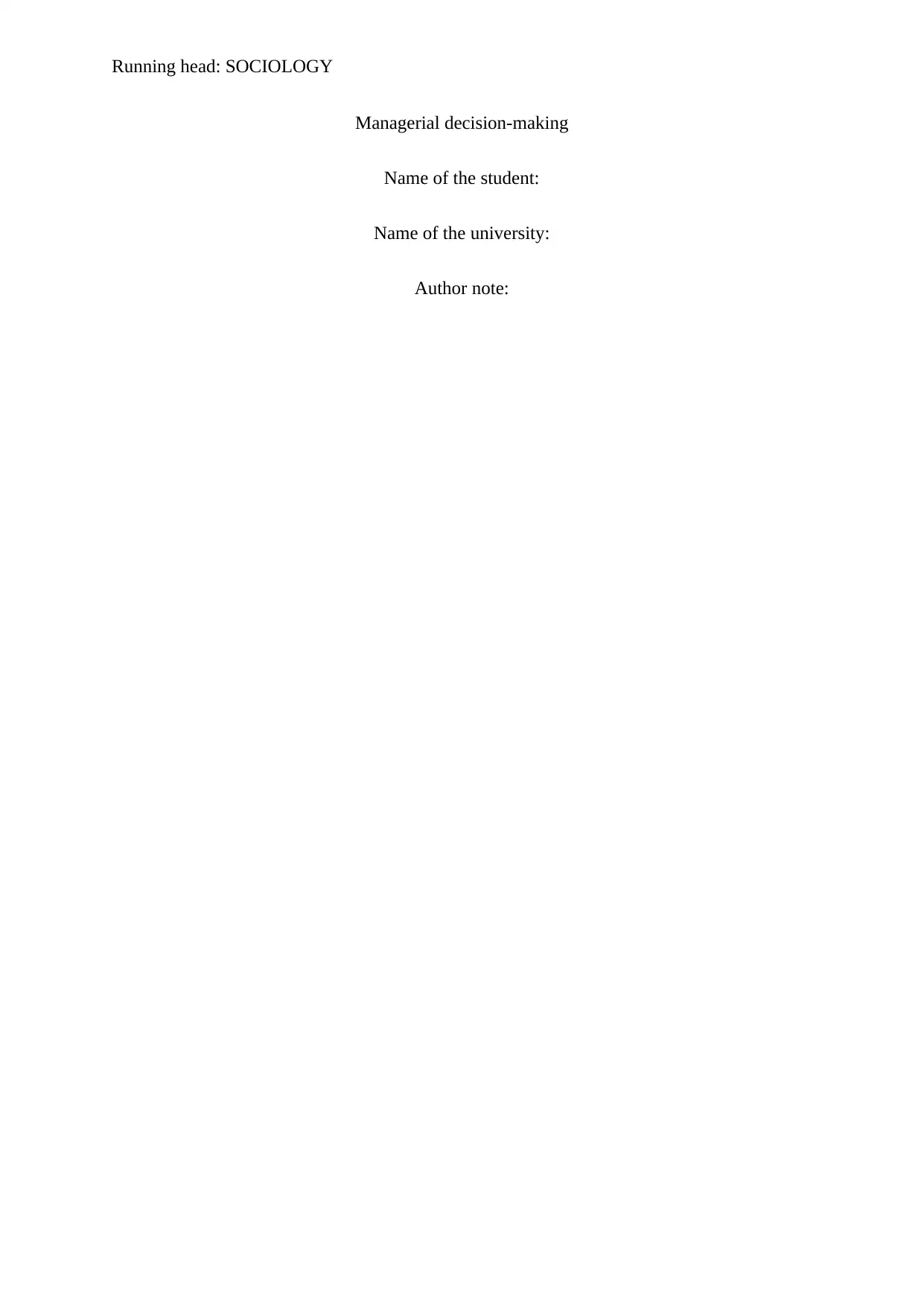
Running head: SOCIOLOGY
Managerial decision-making
Name of the student:
Name of the university:
Author note:
Managerial decision-making
Name of the student:
Name of the university:
Author note:
Paraphrase This Document
Need a fresh take? Get an instant paraphrase of this document with our AI Paraphraser
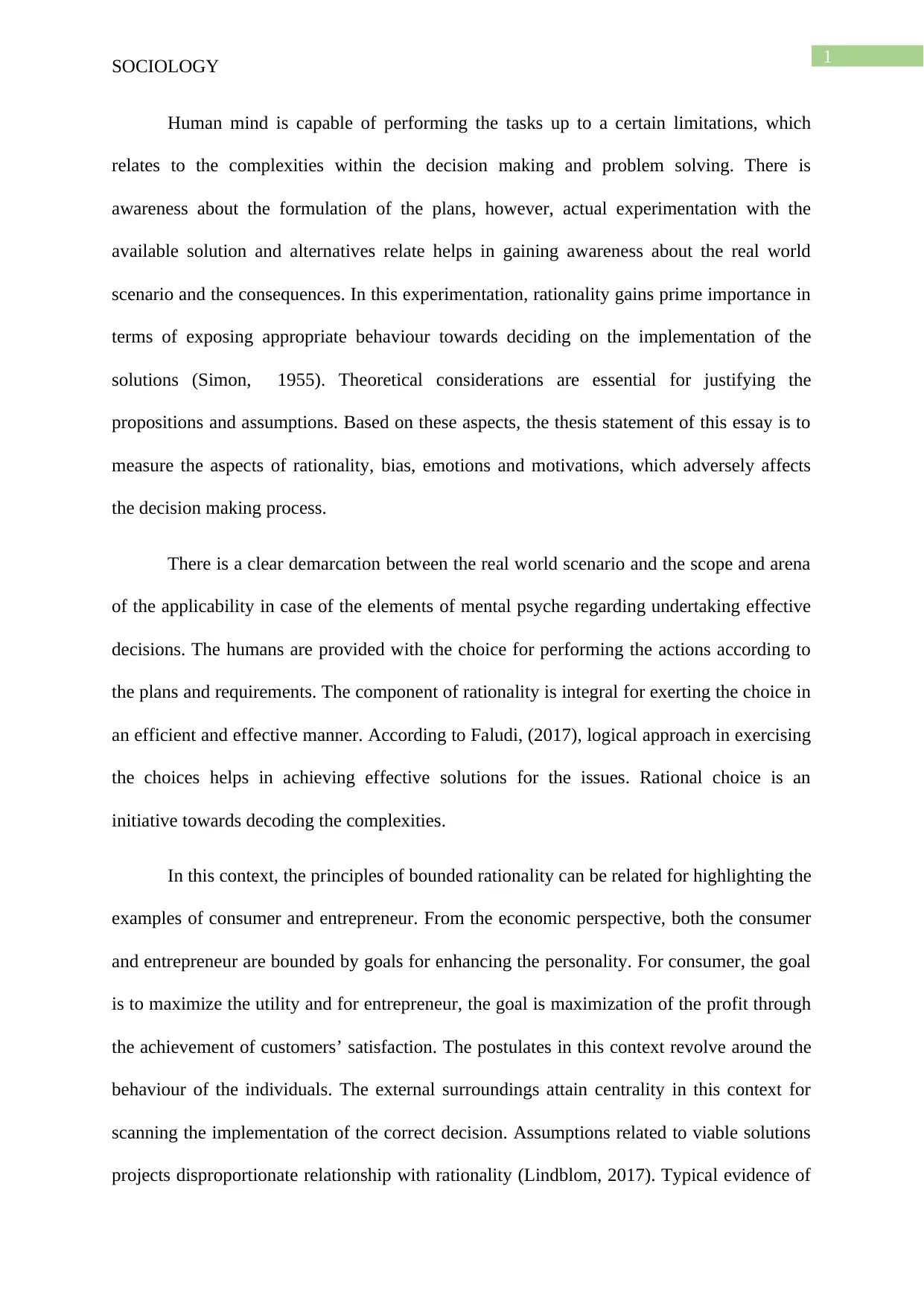
1
SOCIOLOGY
Human mind is capable of performing the tasks up to a certain limitations, which
relates to the complexities within the decision making and problem solving. There is
awareness about the formulation of the plans, however, actual experimentation with the
available solution and alternatives relate helps in gaining awareness about the real world
scenario and the consequences. In this experimentation, rationality gains prime importance in
terms of exposing appropriate behaviour towards deciding on the implementation of the
solutions (Simon, 1955). Theoretical considerations are essential for justifying the
propositions and assumptions. Based on these aspects, the thesis statement of this essay is to
measure the aspects of rationality, bias, emotions and motivations, which adversely affects
the decision making process.
There is a clear demarcation between the real world scenario and the scope and arena
of the applicability in case of the elements of mental psyche regarding undertaking effective
decisions. The humans are provided with the choice for performing the actions according to
the plans and requirements. The component of rationality is integral for exerting the choice in
an efficient and effective manner. According to Faludi, (2017), logical approach in exercising
the choices helps in achieving effective solutions for the issues. Rational choice is an
initiative towards decoding the complexities.
In this context, the principles of bounded rationality can be related for highlighting the
examples of consumer and entrepreneur. From the economic perspective, both the consumer
and entrepreneur are bounded by goals for enhancing the personality. For consumer, the goal
is to maximize the utility and for entrepreneur, the goal is maximization of the profit through
the achievement of customers’ satisfaction. The postulates in this context revolve around the
behaviour of the individuals. The external surroundings attain centrality in this context for
scanning the implementation of the correct decision. Assumptions related to viable solutions
projects disproportionate relationship with rationality (Lindblom, 2017). Typical evidence of
SOCIOLOGY
Human mind is capable of performing the tasks up to a certain limitations, which
relates to the complexities within the decision making and problem solving. There is
awareness about the formulation of the plans, however, actual experimentation with the
available solution and alternatives relate helps in gaining awareness about the real world
scenario and the consequences. In this experimentation, rationality gains prime importance in
terms of exposing appropriate behaviour towards deciding on the implementation of the
solutions (Simon, 1955). Theoretical considerations are essential for justifying the
propositions and assumptions. Based on these aspects, the thesis statement of this essay is to
measure the aspects of rationality, bias, emotions and motivations, which adversely affects
the decision making process.
There is a clear demarcation between the real world scenario and the scope and arena
of the applicability in case of the elements of mental psyche regarding undertaking effective
decisions. The humans are provided with the choice for performing the actions according to
the plans and requirements. The component of rationality is integral for exerting the choice in
an efficient and effective manner. According to Faludi, (2017), logical approach in exercising
the choices helps in achieving effective solutions for the issues. Rational choice is an
initiative towards decoding the complexities.
In this context, the principles of bounded rationality can be related for highlighting the
examples of consumer and entrepreneur. From the economic perspective, both the consumer
and entrepreneur are bounded by goals for enhancing the personality. For consumer, the goal
is to maximize the utility and for entrepreneur, the goal is maximization of the profit through
the achievement of customers’ satisfaction. The postulates in this context revolve around the
behaviour of the individuals. The external surroundings attain centrality in this context for
scanning the implementation of the correct decision. Assumptions related to viable solutions
projects disproportionate relationship with rationality (Lindblom, 2017). Typical evidence of
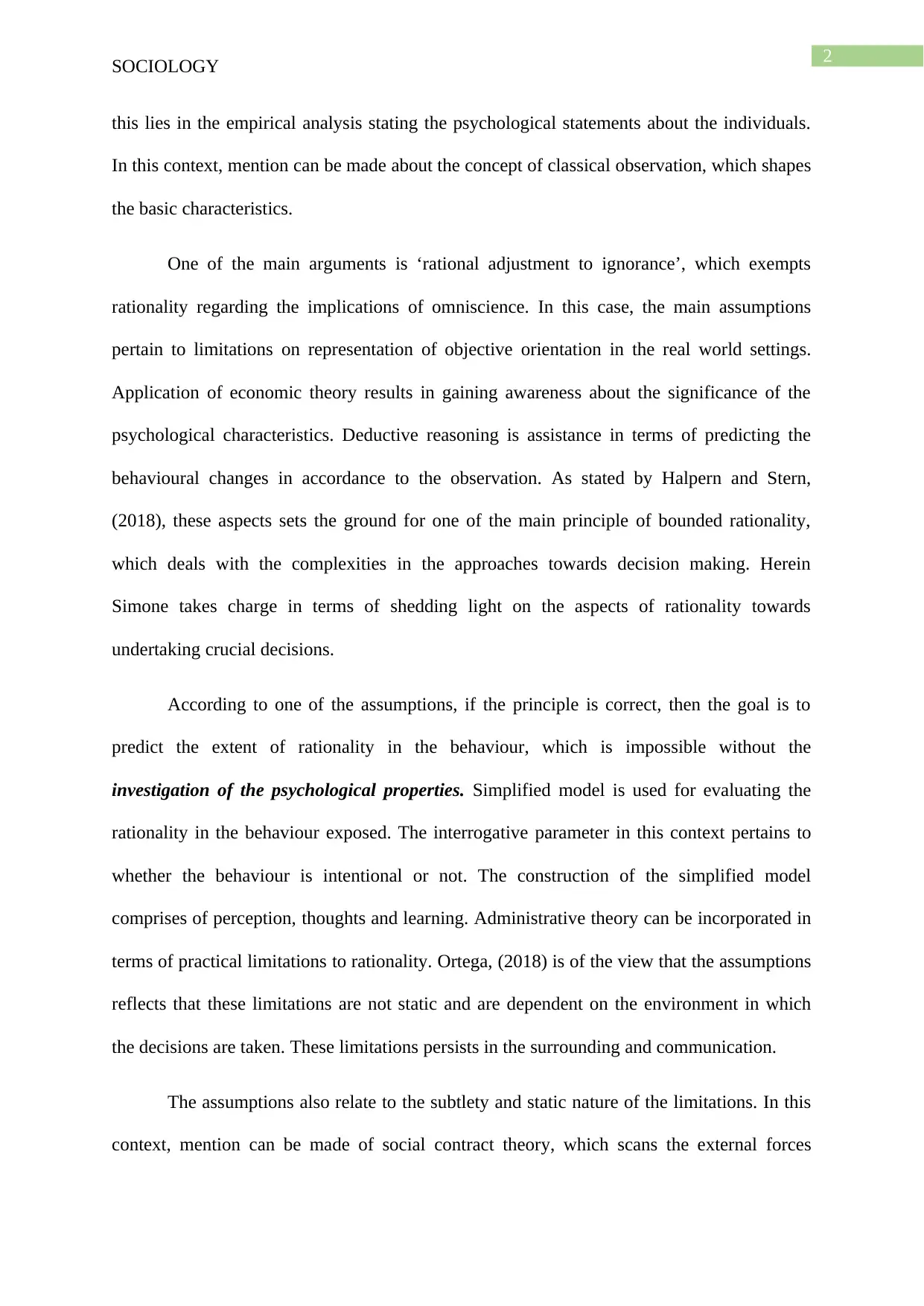
2
SOCIOLOGY
this lies in the empirical analysis stating the psychological statements about the individuals.
In this context, mention can be made about the concept of classical observation, which shapes
the basic characteristics.
One of the main arguments is ‘rational adjustment to ignorance’, which exempts
rationality regarding the implications of omniscience. In this case, the main assumptions
pertain to limitations on representation of objective orientation in the real world settings.
Application of economic theory results in gaining awareness about the significance of the
psychological characteristics. Deductive reasoning is assistance in terms of predicting the
behavioural changes in accordance to the observation. As stated by Halpern and Stern,
(2018), these aspects sets the ground for one of the main principle of bounded rationality,
which deals with the complexities in the approaches towards decision making. Herein
Simone takes charge in terms of shedding light on the aspects of rationality towards
undertaking crucial decisions.
According to one of the assumptions, if the principle is correct, then the goal is to
predict the extent of rationality in the behaviour, which is impossible without the
investigation of the psychological properties. Simplified model is used for evaluating the
rationality in the behaviour exposed. The interrogative parameter in this context pertains to
whether the behaviour is intentional or not. The construction of the simplified model
comprises of perception, thoughts and learning. Administrative theory can be incorporated in
terms of practical limitations to rationality. Ortega, (2018) is of the view that the assumptions
reflects that these limitations are not static and are dependent on the environment in which
the decisions are taken. These limitations persists in the surrounding and communication.
The assumptions also relate to the subtlety and static nature of the limitations. In this
context, mention can be made of social contract theory, which scans the external forces
SOCIOLOGY
this lies in the empirical analysis stating the psychological statements about the individuals.
In this context, mention can be made about the concept of classical observation, which shapes
the basic characteristics.
One of the main arguments is ‘rational adjustment to ignorance’, which exempts
rationality regarding the implications of omniscience. In this case, the main assumptions
pertain to limitations on representation of objective orientation in the real world settings.
Application of economic theory results in gaining awareness about the significance of the
psychological characteristics. Deductive reasoning is assistance in terms of predicting the
behavioural changes in accordance to the observation. As stated by Halpern and Stern,
(2018), these aspects sets the ground for one of the main principle of bounded rationality,
which deals with the complexities in the approaches towards decision making. Herein
Simone takes charge in terms of shedding light on the aspects of rationality towards
undertaking crucial decisions.
According to one of the assumptions, if the principle is correct, then the goal is to
predict the extent of rationality in the behaviour, which is impossible without the
investigation of the psychological properties. Simplified model is used for evaluating the
rationality in the behaviour exposed. The interrogative parameter in this context pertains to
whether the behaviour is intentional or not. The construction of the simplified model
comprises of perception, thoughts and learning. Administrative theory can be incorporated in
terms of practical limitations to rationality. Ortega, (2018) is of the view that the assumptions
reflects that these limitations are not static and are dependent on the environment in which
the decisions are taken. These limitations persists in the surrounding and communication.
The assumptions also relate to the subtlety and static nature of the limitations. In this
context, mention can be made of social contract theory, which scans the external forces
⊘ This is a preview!⊘
Do you want full access?
Subscribe today to unlock all pages.

Trusted by 1+ million students worldwide
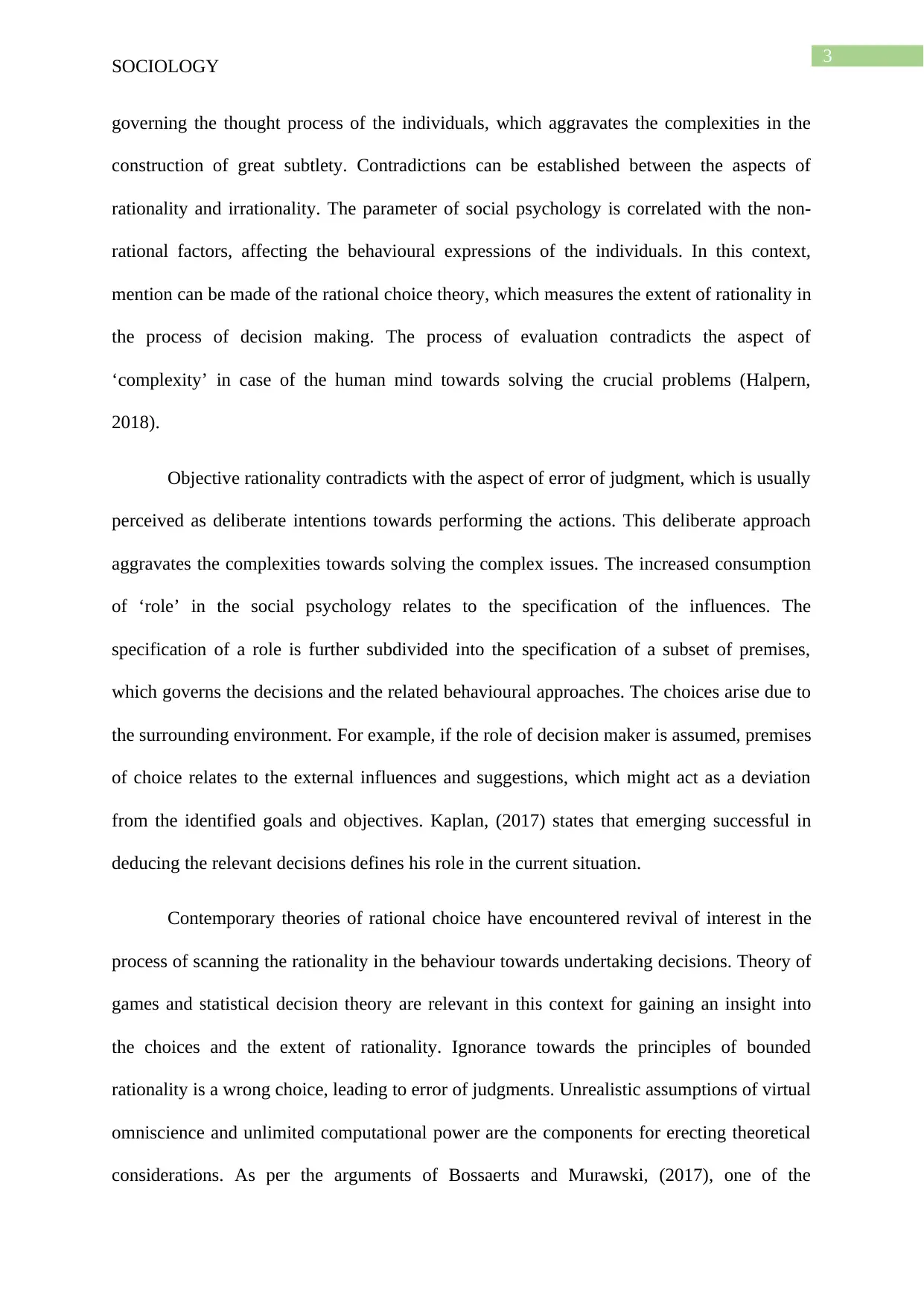
3
SOCIOLOGY
governing the thought process of the individuals, which aggravates the complexities in the
construction of great subtlety. Contradictions can be established between the aspects of
rationality and irrationality. The parameter of social psychology is correlated with the non-
rational factors, affecting the behavioural expressions of the individuals. In this context,
mention can be made of the rational choice theory, which measures the extent of rationality in
the process of decision making. The process of evaluation contradicts the aspect of
‘complexity’ in case of the human mind towards solving the crucial problems (Halpern,
2018).
Objective rationality contradicts with the aspect of error of judgment, which is usually
perceived as deliberate intentions towards performing the actions. This deliberate approach
aggravates the complexities towards solving the complex issues. The increased consumption
of ‘role’ in the social psychology relates to the specification of the influences. The
specification of a role is further subdivided into the specification of a subset of premises,
which governs the decisions and the related behavioural approaches. The choices arise due to
the surrounding environment. For example, if the role of decision maker is assumed, premises
of choice relates to the external influences and suggestions, which might act as a deviation
from the identified goals and objectives. Kaplan, (2017) states that emerging successful in
deducing the relevant decisions defines his role in the current situation.
Contemporary theories of rational choice have encountered revival of interest in the
process of scanning the rationality in the behaviour towards undertaking decisions. Theory of
games and statistical decision theory are relevant in this context for gaining an insight into
the choices and the extent of rationality. Ignorance towards the principles of bounded
rationality is a wrong choice, leading to error of judgments. Unrealistic assumptions of virtual
omniscience and unlimited computational power are the components for erecting theoretical
considerations. As per the arguments of Bossaerts and Murawski, (2017), one of the
SOCIOLOGY
governing the thought process of the individuals, which aggravates the complexities in the
construction of great subtlety. Contradictions can be established between the aspects of
rationality and irrationality. The parameter of social psychology is correlated with the non-
rational factors, affecting the behavioural expressions of the individuals. In this context,
mention can be made of the rational choice theory, which measures the extent of rationality in
the process of decision making. The process of evaluation contradicts the aspect of
‘complexity’ in case of the human mind towards solving the crucial problems (Halpern,
2018).
Objective rationality contradicts with the aspect of error of judgment, which is usually
perceived as deliberate intentions towards performing the actions. This deliberate approach
aggravates the complexities towards solving the complex issues. The increased consumption
of ‘role’ in the social psychology relates to the specification of the influences. The
specification of a role is further subdivided into the specification of a subset of premises,
which governs the decisions and the related behavioural approaches. The choices arise due to
the surrounding environment. For example, if the role of decision maker is assumed, premises
of choice relates to the external influences and suggestions, which might act as a deviation
from the identified goals and objectives. Kaplan, (2017) states that emerging successful in
deducing the relevant decisions defines his role in the current situation.
Contemporary theories of rational choice have encountered revival of interest in the
process of scanning the rationality in the behaviour towards undertaking decisions. Theory of
games and statistical decision theory are relevant in this context for gaining an insight into
the choices and the extent of rationality. Ignorance towards the principles of bounded
rationality is a wrong choice, leading to error of judgments. Unrealistic assumptions of virtual
omniscience and unlimited computational power are the components for erecting theoretical
considerations. As per the arguments of Bossaerts and Murawski, (2017), one of the
Paraphrase This Document
Need a fresh take? Get an instant paraphrase of this document with our AI Paraphraser
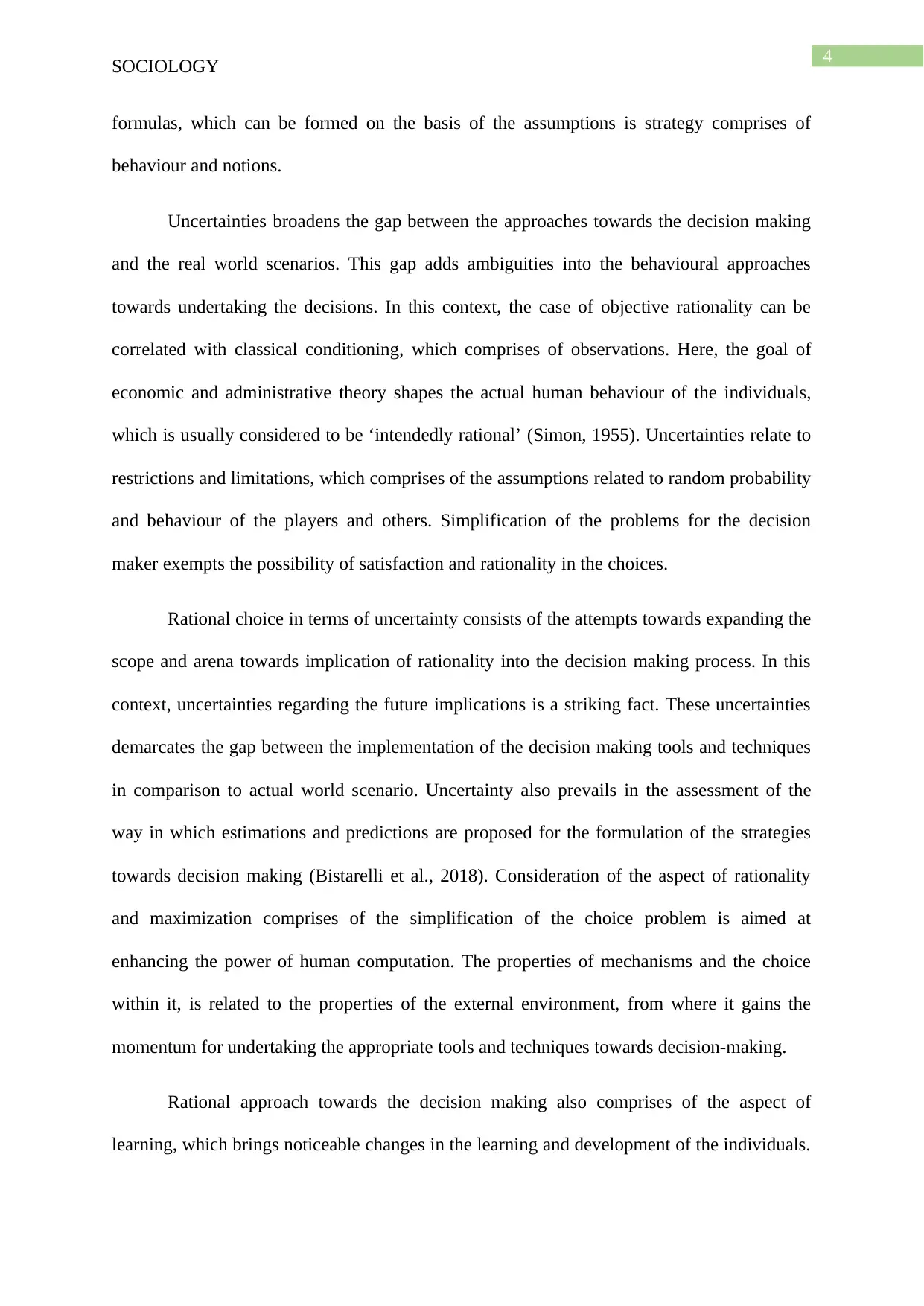
4
SOCIOLOGY
formulas, which can be formed on the basis of the assumptions is strategy comprises of
behaviour and notions.
Uncertainties broadens the gap between the approaches towards the decision making
and the real world scenarios. This gap adds ambiguities into the behavioural approaches
towards undertaking the decisions. In this context, the case of objective rationality can be
correlated with classical conditioning, which comprises of observations. Here, the goal of
economic and administrative theory shapes the actual human behaviour of the individuals,
which is usually considered to be ‘intendedly rational’ (Simon, 1955). Uncertainties relate to
restrictions and limitations, which comprises of the assumptions related to random probability
and behaviour of the players and others. Simplification of the problems for the decision
maker exempts the possibility of satisfaction and rationality in the choices.
Rational choice in terms of uncertainty consists of the attempts towards expanding the
scope and arena towards implication of rationality into the decision making process. In this
context, uncertainties regarding the future implications is a striking fact. These uncertainties
demarcates the gap between the implementation of the decision making tools and techniques
in comparison to actual world scenario. Uncertainty also prevails in the assessment of the
way in which estimations and predictions are proposed for the formulation of the strategies
towards decision making (Bistarelli et al., 2018). Consideration of the aspect of rationality
and maximization comprises of the simplification of the choice problem is aimed at
enhancing the power of human computation. The properties of mechanisms and the choice
within it, is related to the properties of the external environment, from where it gains the
momentum for undertaking the appropriate tools and techniques towards decision-making.
Rational approach towards the decision making also comprises of the aspect of
learning, which brings noticeable changes in the learning and development of the individuals.
SOCIOLOGY
formulas, which can be formed on the basis of the assumptions is strategy comprises of
behaviour and notions.
Uncertainties broadens the gap between the approaches towards the decision making
and the real world scenarios. This gap adds ambiguities into the behavioural approaches
towards undertaking the decisions. In this context, the case of objective rationality can be
correlated with classical conditioning, which comprises of observations. Here, the goal of
economic and administrative theory shapes the actual human behaviour of the individuals,
which is usually considered to be ‘intendedly rational’ (Simon, 1955). Uncertainties relate to
restrictions and limitations, which comprises of the assumptions related to random probability
and behaviour of the players and others. Simplification of the problems for the decision
maker exempts the possibility of satisfaction and rationality in the choices.
Rational choice in terms of uncertainty consists of the attempts towards expanding the
scope and arena towards implication of rationality into the decision making process. In this
context, uncertainties regarding the future implications is a striking fact. These uncertainties
demarcates the gap between the implementation of the decision making tools and techniques
in comparison to actual world scenario. Uncertainty also prevails in the assessment of the
way in which estimations and predictions are proposed for the formulation of the strategies
towards decision making (Bistarelli et al., 2018). Consideration of the aspect of rationality
and maximization comprises of the simplification of the choice problem is aimed at
enhancing the power of human computation. The properties of mechanisms and the choice
within it, is related to the properties of the external environment, from where it gains the
momentum for undertaking the appropriate tools and techniques towards decision-making.
Rational approach towards the decision making also comprises of the aspect of
learning, which brings noticeable changes in the learning and development of the individuals.
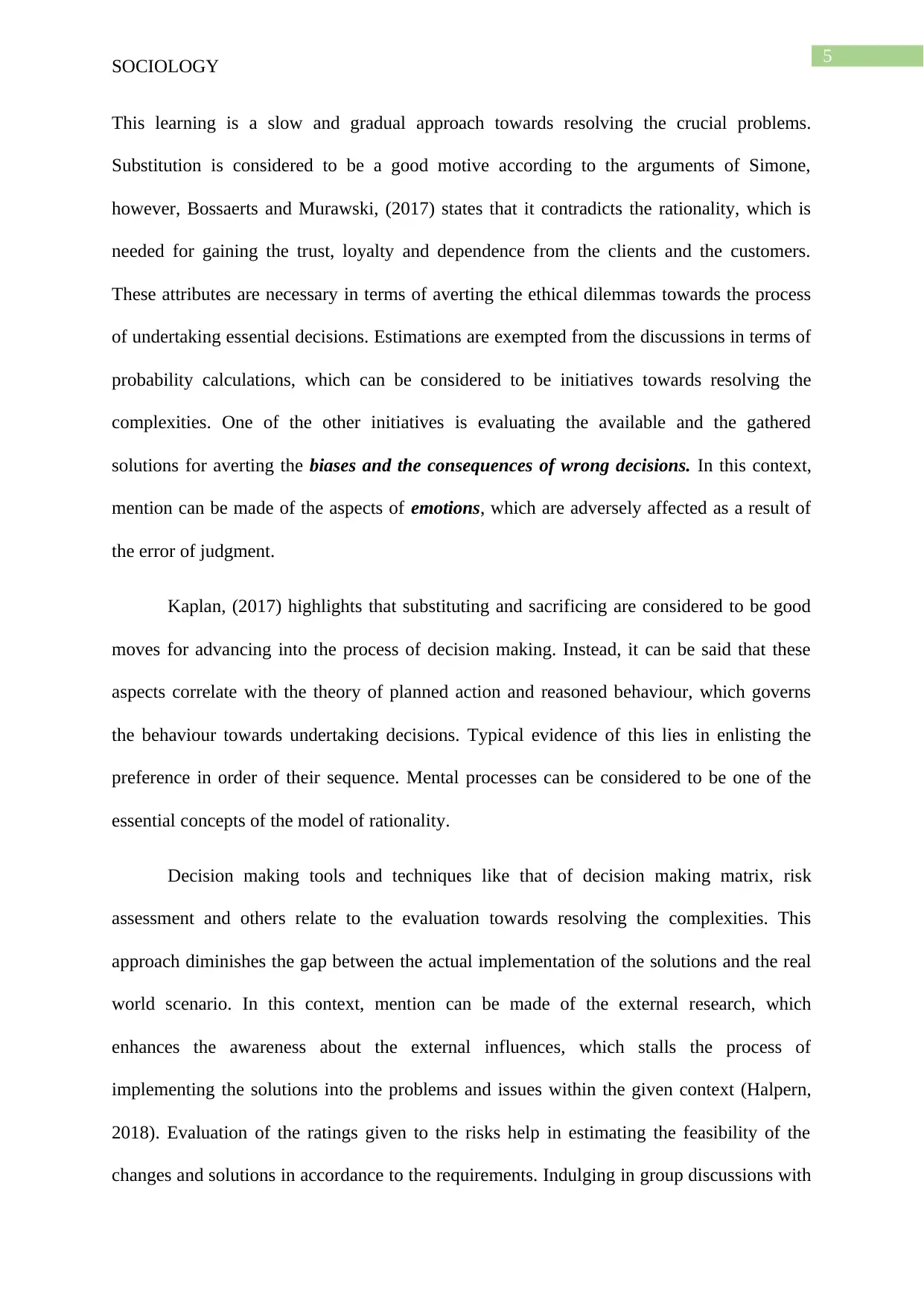
5
SOCIOLOGY
This learning is a slow and gradual approach towards resolving the crucial problems.
Substitution is considered to be a good motive according to the arguments of Simone,
however, Bossaerts and Murawski, (2017) states that it contradicts the rationality, which is
needed for gaining the trust, loyalty and dependence from the clients and the customers.
These attributes are necessary in terms of averting the ethical dilemmas towards the process
of undertaking essential decisions. Estimations are exempted from the discussions in terms of
probability calculations, which can be considered to be initiatives towards resolving the
complexities. One of the other initiatives is evaluating the available and the gathered
solutions for averting the biases and the consequences of wrong decisions. In this context,
mention can be made of the aspects of emotions, which are adversely affected as a result of
the error of judgment.
Kaplan, (2017) highlights that substituting and sacrificing are considered to be good
moves for advancing into the process of decision making. Instead, it can be said that these
aspects correlate with the theory of planned action and reasoned behaviour, which governs
the behaviour towards undertaking decisions. Typical evidence of this lies in enlisting the
preference in order of their sequence. Mental processes can be considered to be one of the
essential concepts of the model of rationality.
Decision making tools and techniques like that of decision making matrix, risk
assessment and others relate to the evaluation towards resolving the complexities. This
approach diminishes the gap between the actual implementation of the solutions and the real
world scenario. In this context, mention can be made of the external research, which
enhances the awareness about the external influences, which stalls the process of
implementing the solutions into the problems and issues within the given context (Halpern,
2018). Evaluation of the ratings given to the risks help in estimating the feasibility of the
changes and solutions in accordance to the requirements. Indulging in group discussions with
SOCIOLOGY
This learning is a slow and gradual approach towards resolving the crucial problems.
Substitution is considered to be a good motive according to the arguments of Simone,
however, Bossaerts and Murawski, (2017) states that it contradicts the rationality, which is
needed for gaining the trust, loyalty and dependence from the clients and the customers.
These attributes are necessary in terms of averting the ethical dilemmas towards the process
of undertaking essential decisions. Estimations are exempted from the discussions in terms of
probability calculations, which can be considered to be initiatives towards resolving the
complexities. One of the other initiatives is evaluating the available and the gathered
solutions for averting the biases and the consequences of wrong decisions. In this context,
mention can be made of the aspects of emotions, which are adversely affected as a result of
the error of judgment.
Kaplan, (2017) highlights that substituting and sacrificing are considered to be good
moves for advancing into the process of decision making. Instead, it can be said that these
aspects correlate with the theory of planned action and reasoned behaviour, which governs
the behaviour towards undertaking decisions. Typical evidence of this lies in enlisting the
preference in order of their sequence. Mental processes can be considered to be one of the
essential concepts of the model of rationality.
Decision making tools and techniques like that of decision making matrix, risk
assessment and others relate to the evaluation towards resolving the complexities. This
approach diminishes the gap between the actual implementation of the solutions and the real
world scenario. In this context, mention can be made of the external research, which
enhances the awareness about the external influences, which stalls the process of
implementing the solutions into the problems and issues within the given context (Halpern,
2018). Evaluation of the ratings given to the risks help in estimating the feasibility of the
changes and solutions in accordance to the requirements. Indulging in group discussions with
⊘ This is a preview!⊘
Do you want full access?
Subscribe today to unlock all pages.

Trusted by 1+ million students worldwide
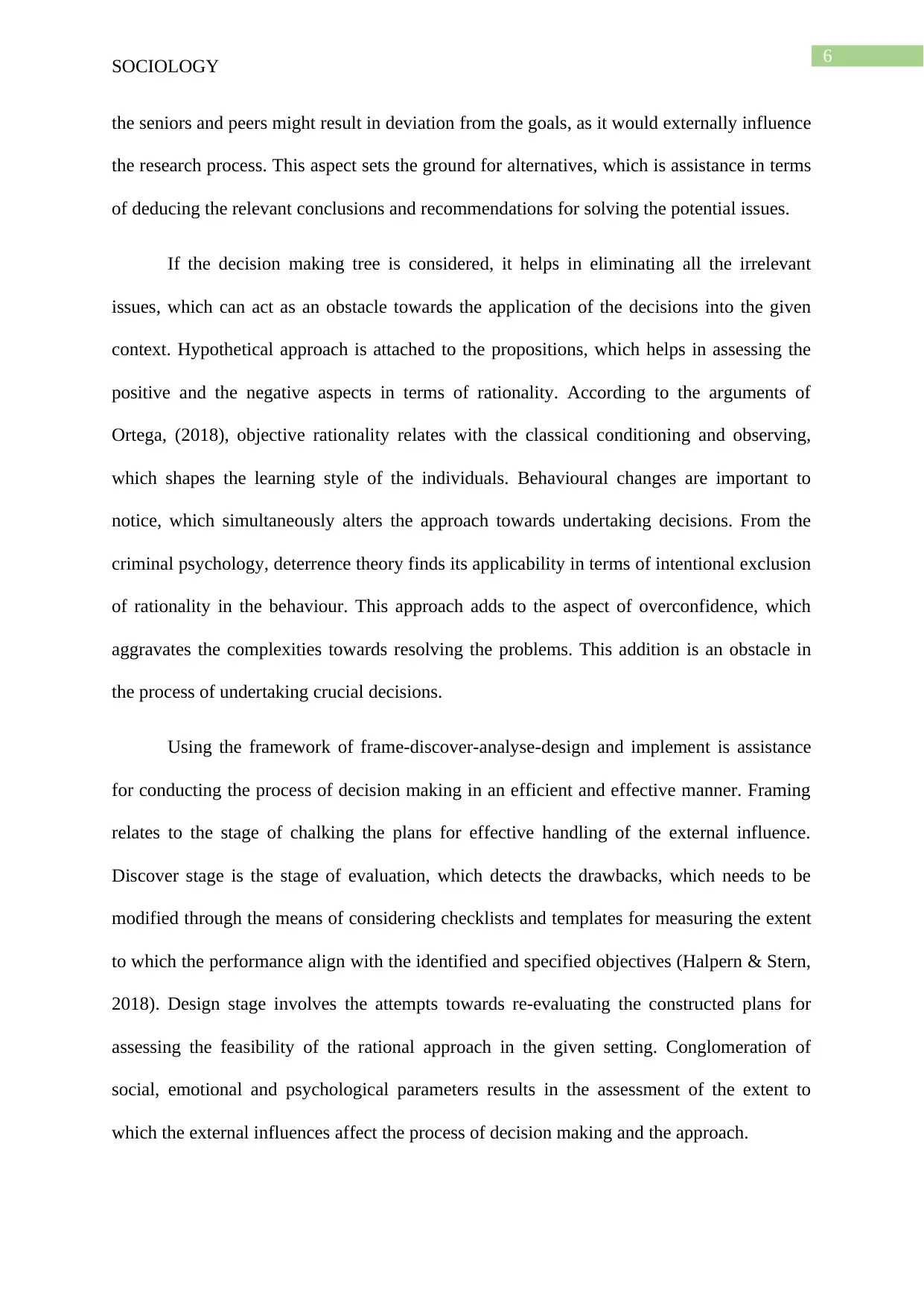
6
SOCIOLOGY
the seniors and peers might result in deviation from the goals, as it would externally influence
the research process. This aspect sets the ground for alternatives, which is assistance in terms
of deducing the relevant conclusions and recommendations for solving the potential issues.
If the decision making tree is considered, it helps in eliminating all the irrelevant
issues, which can act as an obstacle towards the application of the decisions into the given
context. Hypothetical approach is attached to the propositions, which helps in assessing the
positive and the negative aspects in terms of rationality. According to the arguments of
Ortega, (2018), objective rationality relates with the classical conditioning and observing,
which shapes the learning style of the individuals. Behavioural changes are important to
notice, which simultaneously alters the approach towards undertaking decisions. From the
criminal psychology, deterrence theory finds its applicability in terms of intentional exclusion
of rationality in the behaviour. This approach adds to the aspect of overconfidence, which
aggravates the complexities towards resolving the problems. This addition is an obstacle in
the process of undertaking crucial decisions.
Using the framework of frame-discover-analyse-design and implement is assistance
for conducting the process of decision making in an efficient and effective manner. Framing
relates to the stage of chalking the plans for effective handling of the external influence.
Discover stage is the stage of evaluation, which detects the drawbacks, which needs to be
modified through the means of considering checklists and templates for measuring the extent
to which the performance align with the identified and specified objectives (Halpern & Stern,
2018). Design stage involves the attempts towards re-evaluating the constructed plans for
assessing the feasibility of the rational approach in the given setting. Conglomeration of
social, emotional and psychological parameters results in the assessment of the extent to
which the external influences affect the process of decision making and the approach.
SOCIOLOGY
the seniors and peers might result in deviation from the goals, as it would externally influence
the research process. This aspect sets the ground for alternatives, which is assistance in terms
of deducing the relevant conclusions and recommendations for solving the potential issues.
If the decision making tree is considered, it helps in eliminating all the irrelevant
issues, which can act as an obstacle towards the application of the decisions into the given
context. Hypothetical approach is attached to the propositions, which helps in assessing the
positive and the negative aspects in terms of rationality. According to the arguments of
Ortega, (2018), objective rationality relates with the classical conditioning and observing,
which shapes the learning style of the individuals. Behavioural changes are important to
notice, which simultaneously alters the approach towards undertaking decisions. From the
criminal psychology, deterrence theory finds its applicability in terms of intentional exclusion
of rationality in the behaviour. This approach adds to the aspect of overconfidence, which
aggravates the complexities towards resolving the problems. This addition is an obstacle in
the process of undertaking crucial decisions.
Using the framework of frame-discover-analyse-design and implement is assistance
for conducting the process of decision making in an efficient and effective manner. Framing
relates to the stage of chalking the plans for effective handling of the external influence.
Discover stage is the stage of evaluation, which detects the drawbacks, which needs to be
modified through the means of considering checklists and templates for measuring the extent
to which the performance align with the identified and specified objectives (Halpern & Stern,
2018). Design stage involves the attempts towards re-evaluating the constructed plans for
assessing the feasibility of the rational approach in the given setting. Conglomeration of
social, emotional and psychological parameters results in the assessment of the extent to
which the external influences affect the process of decision making and the approach.
Paraphrase This Document
Need a fresh take? Get an instant paraphrase of this document with our AI Paraphraser
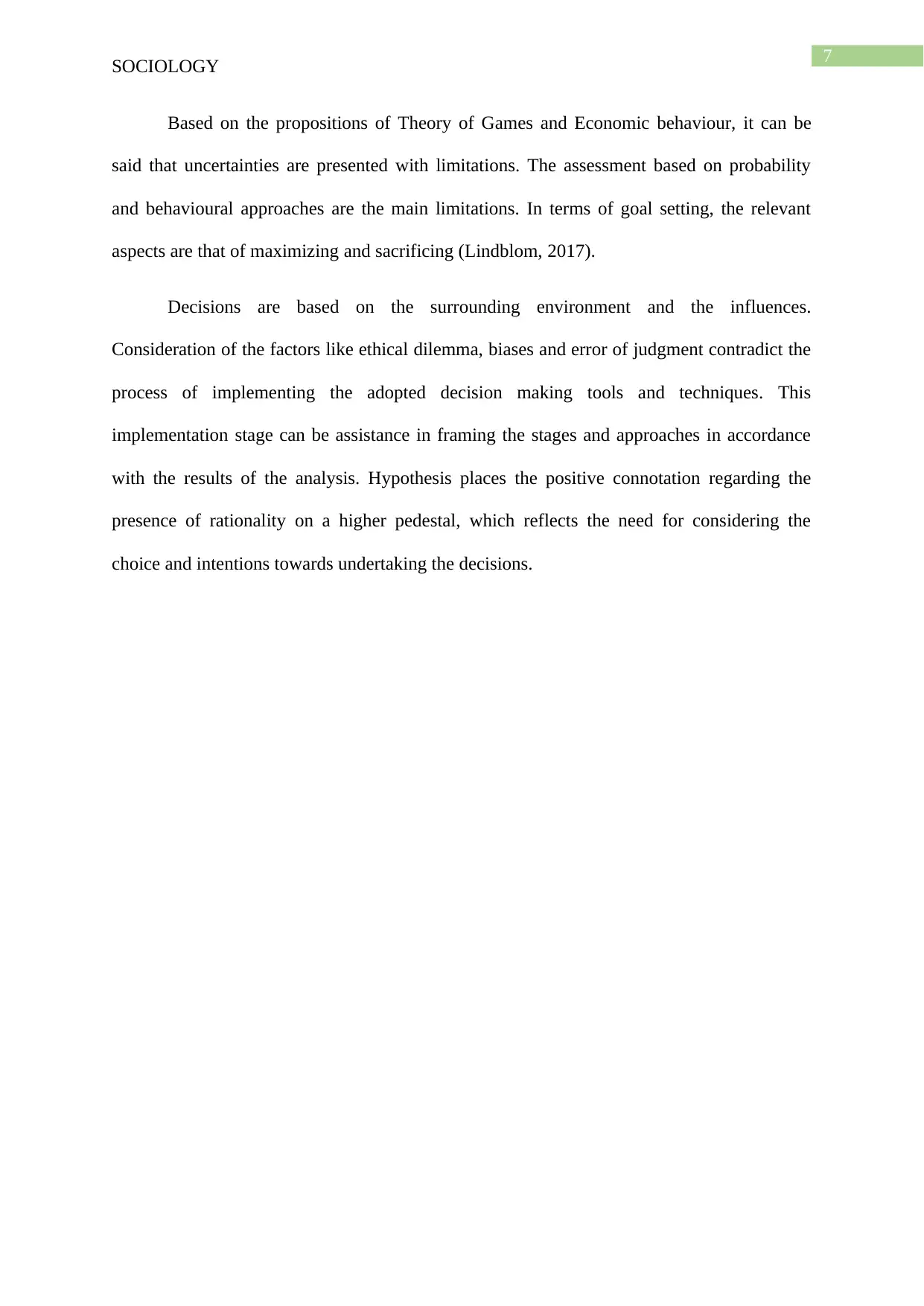
7
SOCIOLOGY
Based on the propositions of Theory of Games and Economic behaviour, it can be
said that uncertainties are presented with limitations. The assessment based on probability
and behavioural approaches are the main limitations. In terms of goal setting, the relevant
aspects are that of maximizing and sacrificing (Lindblom, 2017).
Decisions are based on the surrounding environment and the influences.
Consideration of the factors like ethical dilemma, biases and error of judgment contradict the
process of implementing the adopted decision making tools and techniques. This
implementation stage can be assistance in framing the stages and approaches in accordance
with the results of the analysis. Hypothesis places the positive connotation regarding the
presence of rationality on a higher pedestal, which reflects the need for considering the
choice and intentions towards undertaking the decisions.
SOCIOLOGY
Based on the propositions of Theory of Games and Economic behaviour, it can be
said that uncertainties are presented with limitations. The assessment based on probability
and behavioural approaches are the main limitations. In terms of goal setting, the relevant
aspects are that of maximizing and sacrificing (Lindblom, 2017).
Decisions are based on the surrounding environment and the influences.
Consideration of the factors like ethical dilemma, biases and error of judgment contradict the
process of implementing the adopted decision making tools and techniques. This
implementation stage can be assistance in framing the stages and approaches in accordance
with the results of the analysis. Hypothesis places the positive connotation regarding the
presence of rationality on a higher pedestal, which reflects the need for considering the
choice and intentions towards undertaking the decisions.
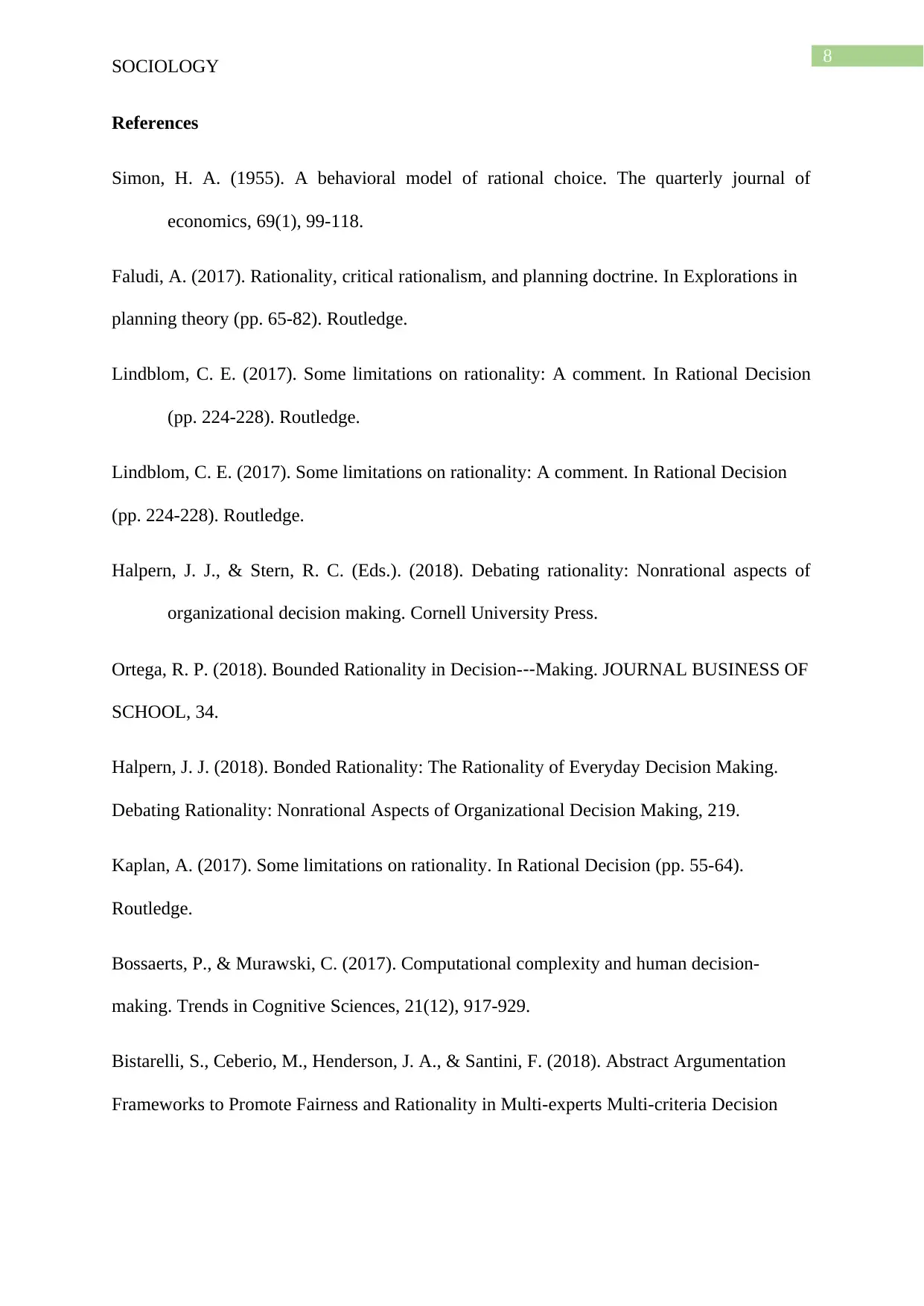
8
SOCIOLOGY
References
Simon, H. A. (1955). A behavioral model of rational choice. The quarterly journal of
economics, 69(1), 99-118.
Faludi, A. (2017). Rationality, critical rationalism, and planning doctrine. In Explorations in
planning theory (pp. 65-82). Routledge.
Lindblom, C. E. (2017). Some limitations on rationality: A comment. In Rational Decision
(pp. 224-228). Routledge.
Lindblom, C. E. (2017). Some limitations on rationality: A comment. In Rational Decision
(pp. 224-228). Routledge.
Halpern, J. J., & Stern, R. C. (Eds.). (2018). Debating rationality: Nonrational aspects of
organizational decision making. Cornell University Press.
Ortega, R. P. (2018). Bounded Rationality in Decision-‐-Making. JOURNAL BUSINESS OF
SCHOOL, 34.
Halpern, J. J. (2018). Bonded Rationality: The Rationality of Everyday Decision Making.
Debating Rationality: Nonrational Aspects of Organizational Decision Making, 219.
Kaplan, A. (2017). Some limitations on rationality. In Rational Decision (pp. 55-64).
Routledge.
Bossaerts, P., & Murawski, C. (2017). Computational complexity and human decision-
making. Trends in Cognitive Sciences, 21(12), 917-929.
Bistarelli, S., Ceberio, M., Henderson, J. A., & Santini, F. (2018). Abstract Argumentation
Frameworks to Promote Fairness and Rationality in Multi-experts Multi-criteria Decision
SOCIOLOGY
References
Simon, H. A. (1955). A behavioral model of rational choice. The quarterly journal of
economics, 69(1), 99-118.
Faludi, A. (2017). Rationality, critical rationalism, and planning doctrine. In Explorations in
planning theory (pp. 65-82). Routledge.
Lindblom, C. E. (2017). Some limitations on rationality: A comment. In Rational Decision
(pp. 224-228). Routledge.
Lindblom, C. E. (2017). Some limitations on rationality: A comment. In Rational Decision
(pp. 224-228). Routledge.
Halpern, J. J., & Stern, R. C. (Eds.). (2018). Debating rationality: Nonrational aspects of
organizational decision making. Cornell University Press.
Ortega, R. P. (2018). Bounded Rationality in Decision-‐-Making. JOURNAL BUSINESS OF
SCHOOL, 34.
Halpern, J. J. (2018). Bonded Rationality: The Rationality of Everyday Decision Making.
Debating Rationality: Nonrational Aspects of Organizational Decision Making, 219.
Kaplan, A. (2017). Some limitations on rationality. In Rational Decision (pp. 55-64).
Routledge.
Bossaerts, P., & Murawski, C. (2017). Computational complexity and human decision-
making. Trends in Cognitive Sciences, 21(12), 917-929.
Bistarelli, S., Ceberio, M., Henderson, J. A., & Santini, F. (2018). Abstract Argumentation
Frameworks to Promote Fairness and Rationality in Multi-experts Multi-criteria Decision
⊘ This is a preview!⊘
Do you want full access?
Subscribe today to unlock all pages.

Trusted by 1+ million students worldwide
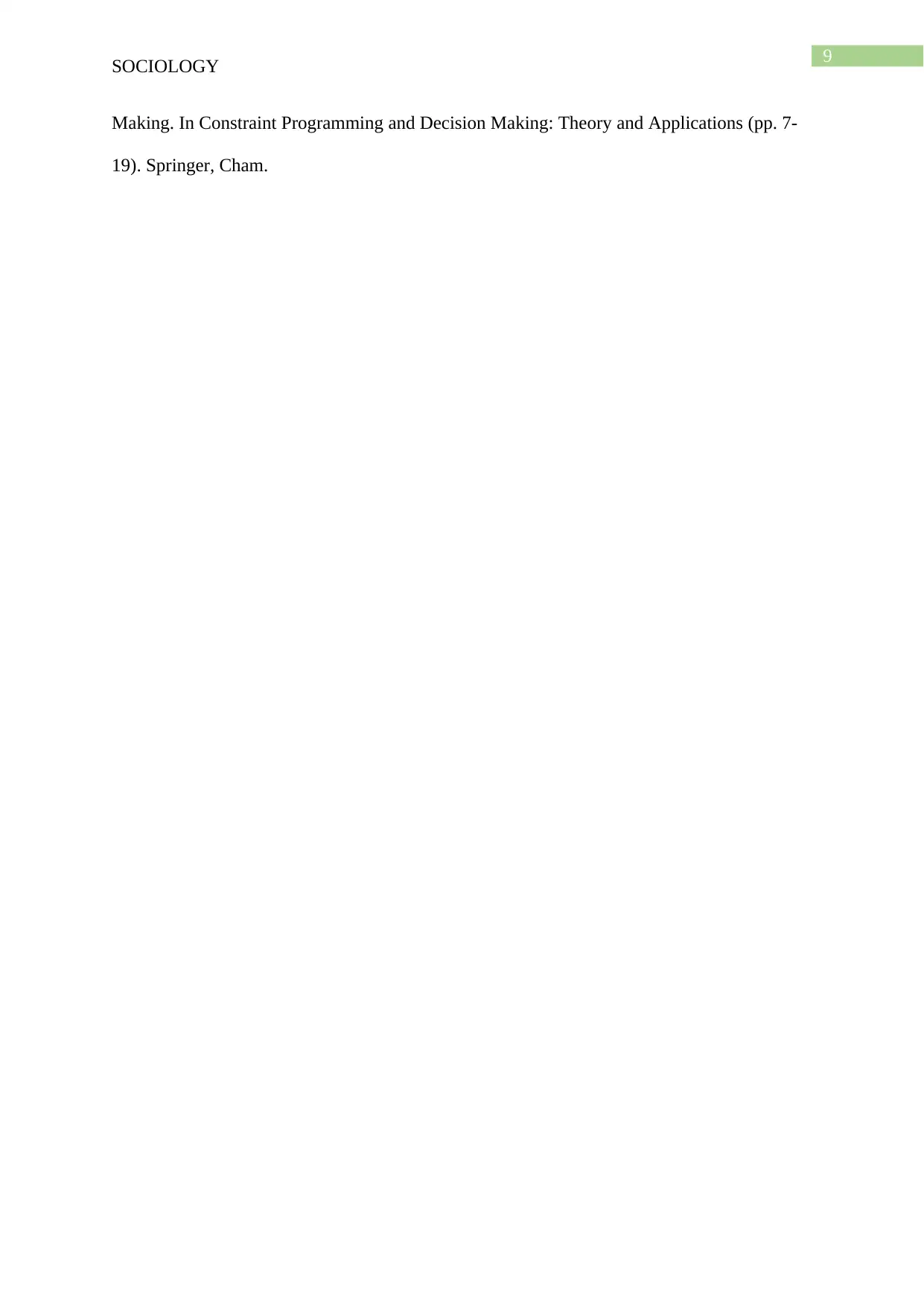
9
SOCIOLOGY
Making. In Constraint Programming and Decision Making: Theory and Applications (pp. 7-
19). Springer, Cham.
SOCIOLOGY
Making. In Constraint Programming and Decision Making: Theory and Applications (pp. 7-
19). Springer, Cham.
1 out of 10
Related Documents
Your All-in-One AI-Powered Toolkit for Academic Success.
+13062052269
info@desklib.com
Available 24*7 on WhatsApp / Email
![[object Object]](/_next/static/media/star-bottom.7253800d.svg)
Unlock your academic potential
Copyright © 2020–2026 A2Z Services. All Rights Reserved. Developed and managed by ZUCOL.





